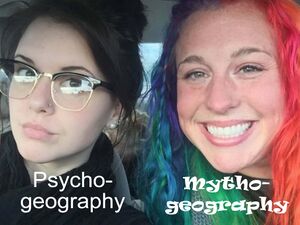Loitering Glossary/Mythogeography: Difference between revisions
No edit summary |
No edit summary |
||
| Line 7: | Line 7: | ||
Psychogeography likes to linger in theory without necessarily arriving anywhere.<br> | Psychogeography likes to linger in theory without necessarily arriving anywhere.<br> | ||
It's not like everything needs to be a glossary entry, everything should be an <big>experience!</big><br> | It's not like everything needs to be a glossary entry, everything should be an <big>experience!</big><br> | ||
<br> | <br> | ||
Does hugging trees count? Yes, probably. Is protesting mythogeographical? Yes, probably<br> | Does hugging trees count? Yes, probably. Is protesting mythogeographical? Yes, probably<br> | ||
Latest revision as of 20:24, 20 May 2024
Collective walking! Peripheral observations! Bodily immersion! Pilgrimages! Ecological activism!
Mythogeography looks at multiplicity, it focuses on layers of stories embedded in places, while critically engaging with them.It blends geography with personal narratives, getting immersed in explorations that become site-specific performative acts.
Psychogeography was all about emotions. It became theoretical quite easily when that nice sparkly patina of avant-gardism faded away. Kinda individualistic before, now even more, far from collectivity, far away in the olympus of the dusty-20th-century-avant-garde-movements.
Mythogeography, instead, is the artsy younger sibling, the one that did theatre school and is all about doing 🎤🎭performances🎸🎶, having meditative experiences around rubbles, crying about disrupting the academy, capitalism, the whole reality if possible.
Psychogeography likes to linger in theory without necessarily arriving anywhere.
It's not like everything needs to be a glossary entry, everything should be an experience!
Does hugging trees count? Yes, probably. Is protesting mythogeographical? Yes, probably

